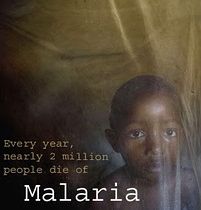Malaria is a parasitic disease that involves high fevers, shaking chills, flu-like symptoms, and anemia.
Causes, Incidence, and Risk Factors:
Malaria is caused by a parasite that is passed from one human to another by the bite of infected Anopheles mosquitoes. After infection, the parasites (called sporozoites) travel through the bloodstream to the liver, where they mature and release another form, the merozoites. The parasites enter the bloodstream and infect red blood cells.
The parasites multiply inside the red blood cells, which then break open within 48 to 72 hours, infecting more red blood cells. The first symptoms usually occur 10 days to 4 weeks after infection, though they can appear as early as 8 days or as long as a year after infection. The symptoms occur in cycles of 48 to 72 hours.
Most Symptoms are caused by:
* The release of merozoites into the bloodstream
* Anemia resulting from the destruction of the red blood cells
* Large amounts of free hemoglobin being released into circulation after red blood cells break open
Malaria can also be transmitted from a mother to her unborn baby (congenitally) and by blood transfusions. Malaria can be carried by mosquitoes in temperate climates, but the parasite disappears over the winter.
The disease is a major health problem in much of the tropics and subtropics. The CDC estimates that there are 300-500 million cases of malaria each year, and more than 1 million people die from it. It presents a major disease hazard for travelers to warm climates.
In some areas of the world, mosquitoes that carry malaria have developed resistance to insecticides. In addition, the parasites have developed resistance to some antibiotics. These conditions have led to difficulty in controlling both the rate of infection and spread of this disease.
There are four types of common malaria parasites. Recently, a fifth type, Plasmodium knowlesi, has been causing malaria in Malaysia and areas of southeast Asia. Another type, falciparum malaria, affects more red blood cells than the other types and is much more serious. It can be fatal within a few hours of the first
symptoms.
Treatment
Malaria, especially Falciparum malaria, is a medical emergency that requires a hospital stay. Chloroquine is often used as an anti-malarial medication. However, chloroquine-resistant infections are common in some parts of the world.
Possible treatments for chloroquine-resistant infections include:
* The combination of quinidine or quinine plus doxycycline, tetracycline, or clindamycin
* Atovaquone plus proguanil (Malarone)
* Mefloquine or artesunate
* The combination of pyrimethamine and sulfadoxine (Fansidar)
The choice of medication depends in part on where you were when you were infected.
Medical care, including fluids through a vein (IV) and other medications and breathing (respiratory) support may be needed.
Prevention
Most people who live in areas where malaria is common have gotten some immunity to the disease. Visitors will not have immunity, and should take preventive medications.
It is important to see your health care provider well before your trip, because treatment may need to begin as long as 2 weeks before travel to the area, and continue for a month after you leave the area. In 2006, the CDC reported that most travelers from the U.S. who contracted malaria failed to take the right precautions.
The types of anti-malarial medications prescribed will depend on the area you visit. According to the CDC, travelers to South America, Africa, the Indian subcontinent, Asia, and the South Pacific should take one of the following drugs: mefloquine, doxycycline, chloroquine, hydroxychloroquine, or Malarone. Even pregnant women should take preventive medications because the risk to the fetus from the medication is less than the risk of catching this infection.
People who are taking anti-malarial medications may still become infected. Avoid mosquito bites by wearing protective clothing over the arms and legs, using screens on windows, and using insect repellent.
Chloroquine has been the drug of choice for protecting against malaria. But because of resistance, it is now only suggested for use in areas where Plasmodium vivax, P. oval, and P. malariae are present. Falciparum malaria is becoming increasingly resistant to anti-malarial medications.
For travelers going to areas where Falciparum malaria is known to occur, there are several options for malaria prevention, including mefloquine, atovaquone/proguanil (Malarone), and doxycycline.
Travelers can call the CDC for information on types of malaria in a certain area, preventive drugs, and times of the year to avoid travel. See: www.cdc.gov
Source: Pub Med Health





